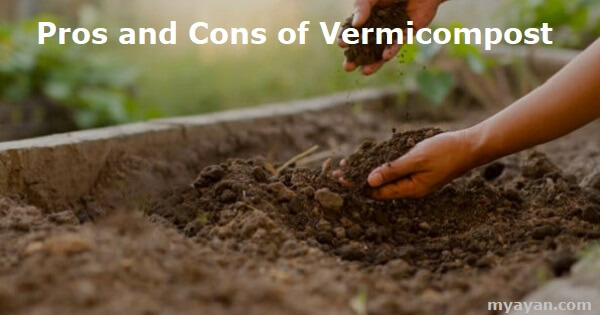You must have heard about vermicompost and its uses This unique and natural method uses worms to break organic waste into nutrient-rich compost that can transform your garden or potted plants. However, like any gardening method or material, you must consider some pros and cons of vermicompost. It’s worth exploring both sides of the coin to decide whether vermicomposting is the right option for you. It’s time to dig in and explore how these wriggly little ones can be your support in your composting routine.
Vermicompost, also known as worm castings or worm compost, is a nutrient-rich organic fertilizer that worms naturally produce. Some of the pros of vermicompost include:
Vermicomposting has a major advantage in efficiently recycling your household waste. With tonnes of waste generated in kitchens every day, you can turn it into nutrient-rich compost for your garden rather than letting it end up in landfills. Vermicomposting not only helps to reduce the waste in landfills but also promotes sustainability by allowing you to return valuable resources to your garden. This closed-loop system reduces our environmental impact.
Vermicompost is created from earthworm waste, which breaks down organic matter and doesn't involve harmful chemicals or synthetic fertilizers. This natural method helps boost soil fertility and promote plant growth.
Vermicompost is highly advantageous due to its rich nutrient content, which can greatly benefit your plants. This organic matter is made of essential macronutrients including, Nitrogen, Phosphorus, Potassium, iron, Calcium, etc. And if you don’t know already, these nutrients are essential for the overall growth of plants. The worms responsible for breaking down organic waste produce a nutrient-rich end product that can work wonders for your garden.
Every decomposable thing you find in your kitchen can be converted into useful and nutrient rich compost. From shredded papers to egg shells, everything can contribute to waste reduction in your home or garden. Do remember that if all these materials were discharged to a landfill, it would have been full of stench and greenhouse gases.
Using nutrient-rich vermicompost is not only eco-friendly but also, helps you save money. You don’t have to rely on store-bought fertilizers and their harmful effects. It’s especially beneficial for your health if you grow veggies and fruits in your garden. Compared to aerobic composting or anaerobic digestion, vermicomposting needs less equipment and space. You don't need expensive machinery or large outdoor bins. Instead, you can use household containers.
Vermicomposting can be a great way to put your worries aside. But, there are some cons of Vermicompost you should check beforehand.
Dealing with flies and insects in vermicomposting is a common problem. Although these pests are naturally attracted to decaying organic matter, they can turn a nuisance if their population grows too large. It's worth noting that not all flies and insects are harmful to the vermicomposting process.
The compost bin may attract fruit flies because they are attracted to decaying fruits and vegetables. Additionally, black soldier fly larvae (BSFL) can be present as they live in warm conditions and consume decomposing organic materials.
To avoid an unpleasant odor when vermicomposting, ensure the compost does not become too wet or compacted. Regular maintenance and adding the proper elements can help you prevent this common issue.
Ensure enough airflow and moisture control to prevent unpleasant smells in your worm bin. You can add dry leaves or shredded newspaper, which absorb excess moisture and help the worms thrive. These carbon-based materials offer an optimal environment for the worms to live in.
To achieve the best results with vermicomposting, maintenance is crucial. Though the process may seem straightforward, it requires consistent effort to succeed. Monitoring the moisture levels, temperature, and pH balance is essential. You may need to adjust periodically to keep these factors within the desired range. It's essential to remain attentive and committed to gardening.
Using vermicompost can be time-consuming as maintaining a healthy vermicomposting system requires effort and dedication from your end, despite worms doing most of the work in breaking down organic matter.
Regularly check your worm bin to ensure the moisture levels, temperature, and pH balance function properly. Promptly adjust if necessary to maintain optimal conditions for the worms.
Pros and Cons of Vermicompost – Conclusion
Vermicomposting is the modern-day practice to go green as it helps reduce landfill waste, and its carbon footprint is much lower than conventional composting. You can make vermicompost in the comfort of your home or garden, making it beneficial for the environment and convenient for gardeners.
But, there are many factors you must consider before you dive into the business. You’ll have to dedicate your time and effort to take care of the entire composting process. The pros of vermicomposting outweigh its cons. It should certainly be something to consider if you're looking to start a new gardening project in your yard or balcony.

It contains microorganisms that help to create and maintain healthy soil besides being rich in nutrients.
Sometimes, there might be gnats or flies around the vermicompost. To fix this problem, leave the lid off to let the bin dry out or water it less frequently. Alternatively, you can add more bedding to spread the moisture.
Adding vermicompost to your plants is beneficial because it contains water-soluble, easily absorbed nutrients. It's recommended to apply the supplement once every 20-25 days, as its effects can last for 15-20 days.
Compared to traditional one, vermicompost is better as it has higher levels of Nitrogen, Phosphorus, and Potassium and its ability to enhance soil structure and increase water retention capabilities.